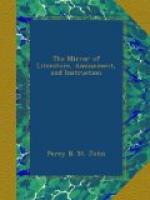Lord Brougham married, in 1816, Mary Anne, relict of John Slade, Esq., of Hill street, Berkeley-square; by whom he has one daughter. Lady Brougham’s maiden name was Eden: she is nearly related to the Auckland and Handley families. At her marriage with Mr. Slade, in 1808, she was accounted an extremely beautiful young woman; and she was still possessed of great personal charms at the period of her second union. Lady Brougham had by her former marriage a son, who inherits his father’s estate, and is an. officer in the army, and a daughter. Lady Brougham brought no property to her husband but her jointure of L1,500 a-year, and the house No. 5, Hill-street.
Lord Brougham was born in 1779, and is, consequently, in his fifty-second year.
[Footnote 1: We are aware of having already quoted these particulars, from the Spectator newspaper, at page 412 of the Mirror, vol. xvi. but their repetition here is essential to the completeness of the present Memoir. Of Lord Brougham’s family, in connexion with Brougham Castle, in Westmoreland, there were many conflicting statements at the period of his lordship’s elevation to the peerage towards the close of last year. The Chancellor is said to have had a latent claim as heir-general to the Barony of Vaux, (whose arms are to be seen on the tower of Brougham Castle,) and hence his creation by that title. Some exclusive information, obligingly furnished, (at the Chancellor’s request, in reply to our application) by a relative of his lordship, will also be found at length in the Mirror, vol. xvi. but for the reader’s convenience we quote its substance: “Before the time of the Norman Conquest, the manor and lordship of Brougham (then called Burgham) were held by the Saxon family of de Burgham, from whom the Lord Chancellor is lineally descended. After the Conquest, William the Norman granted to Robert de Veteripont, or Vipont, extensive rights and territories in Westmoreland; and among others, some oppressive rights of seigniory over the manor of Brougham, then held by Walter de Burgham. To relieve the estate of such services, Gilbert de Burgham, in the reign of King John, agreed to give up absolutely one-third part of his estate to Robert de Veteripont, and also the advowson of the rectory of Brougham. This third comprises the land upon




